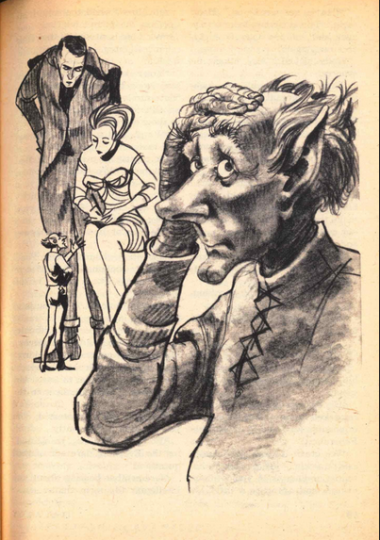Kris: By pure coincidence I had read this yesterday when I was flicking through old Galaxy issues. My feeling about this is that it is…okay. It is very much of its time with the characters being the hapless ad exec and beautiful woman thrown into a bizarre tale and find themselves out their depth, which often happened in the 50s and 60s. Leache’s style is good and clean but not exceptional. The whole thing seems an exercise in competence of the kind of stories that would come out of this era but not one that really stands out.
The main thing I think I will be left wondering about is the character name of Blahrog, was that an intentional play on Balrog but meant to be boring? I assume Featherpenny is meant to be a play on Moneypenny from the Bond novels so it seems possible.
Gavin: This story seems almost auto-biographical. An ad executive in over his head winds up initially dismissing his stenographer, admittedly for some terrible ideas and missteps. But the steno eventually comes up with the right idea, and she feeds that idea to a rather drunk ad executive, who has received too much of the local “hospitality”. At least Don Draper had a stronger liver…
This story is as much about gender roles as anything else. The steno winds up saving the day, not once, but twice, and the ad executive only comes to the conclusion that “[he] can’t think unless [she’s] around”! Basically, she’s slipping him ideas while he’s drunk, and then filing the paperwork herself to get it done. Doing most of the work, and getting none of the credit.
I have to think that at least part of the motivation of the steno was to help the planet in question. They were in dire straits, she worked for the company that was supposed to help them, and she’d made friends with one of the locals. Naturally, her counterpart on the planet was as savvy as she was, and only by working together could they succeed. In this story, the women save the day while the men get all the credit.
Stories are often vehicles for self-expression, and the expression in this story is “women aren’t taken seriously unless they work through a man, or pretend to be one”. I never lived through the time in which this story was written, but I know women who did. I’m pretty sure they’d agree it was a fair reflection of the times. Like I said, this story seems almost auto-biographical.
Faced with a world that didn’t take her seriously, she channelled her experiences into a rather decent story. A reflection of the time she lived in; a desperate message in a bottle. In the end, it seeks only to portray this era accurately, leaving it to the reader to pick up on the message laid quietly within. It’s likely that someone who didn’t see the unfairness of the time would never have spotted this quiet and subtle message. That’s probably how it got past her editor.
One has to wonder which social issues we’re ignoring now, only obvious with a decade or two of hindsight…In any case, I look forward to the oscar bait movie they’ll inevitably option off this story.
Joe: I didn’t particularly enjoy this story, I think in large part because it didn’t do much with the science fiction setting. We have space travel and aliens, but other than that it’s just a 1950s ad agency. If our wannabe Don Draper were visiting some developing country rather than a planet on the edge of nowhere, the story would be much the same.
This would be fine if there were something else to like about it, but… The writing is fine, it’s competent, but it’s nothing more; the alien culture (which is the only interesting thing in the whole story) is barely explored (probably because one of the main characters has basically no interest in it, and the other is his stenographer and has to do what he says). On top of that, we get a bunch of 1950s sexism — I see what the author is doing, here, but it’s not exactly fun to read several hundred words of “man is chauvinist boor”. And the story ends with Miss Featherpenny, the closest thing this story has to a hero, marrying said chauvinist boor. Which makes sense in the story, but I still don’t want to read a story which culminates in the asshole going through precisely no character growth and getting rewarded for it. Yes, that’s how the world actually works. No, I don’t enjoy being reminded of that in my fiction.
I might have been able to forgive all of this if the story did something interesting with the setting, or if it did more exploration of the alien cultures. Or if it had actually gone somewhere with the early commentary on the tourism industry and its themeparkization of “exotic” or “primitive” cultures, which actually seemed like an interesting angle to explore. Or if the writing had evoked any emotion in me other than “God, Andy is an asshole”.

